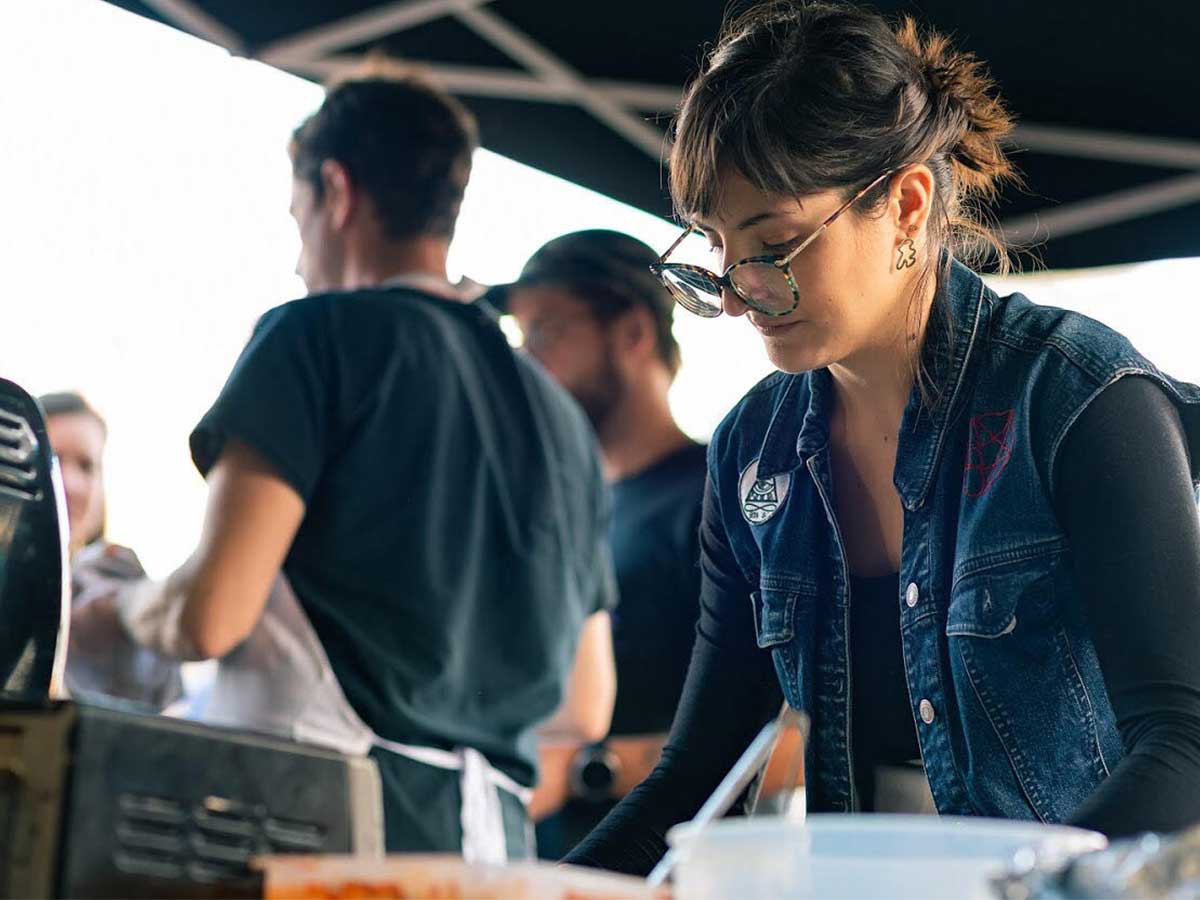VCU alum breaks into Richmond restaurant scene
Aug. 19, 2021

The Richmond restaurant scene just got a little bit spicier. Ashley Patino’s passion for Italian and Mediterranean culture and cuisine lead her across the country to hone her baking skills. Not only has she baked with popular Richmond bakeries, such as Sugar and Twine and Sub Rosa, but she also worked at a variety of bakeries on the West Coast, such as Tartine Bakery in San Francisco. Patino also received a certificate from the Umbra Institute’s food studies program in Perugia, Italy. After honing her skills, she moved back to Richmond where she recently started her restaurant, Pizza Bones.
Patino graduated from VCU in 2012 with a bachelor’s degree in . It was while at VCU that she discovered her passion for coffee and baking. Pizza Bones functions as a bakery and coffee roaster in the morning and transforms into a pizza shop in the evenings. Pizza Bones partners with other local Richmond restaurants to share their creations with the community through pop-ups. Currently, you can find Pizza Bones at The Jasper on Saturdays and Charm School on Sundays.
What are you passionate about?
I am passionate about community and hospitality — those are the first two words that come to mind. Quality food and wine are a plus, but both of those are more fun when you can share them.
Have you always wanted to start your own business?
More or less, yes. I didn’t always know what my business would look like. Sometimes I still don’t.
What inspired you to start Pizza Bones?
Hosting pizza parties years ago, baking and the efficiency of pizza production. I find logistics very interesting.
How did you come up with the name Pizza Bones?
In college, a friend of a friend referred to the leftover crust as “bones” and got a kick out of it. Later I told another friend about the new learned slang and he said, “That’s it! That’s the name of your spot!” I kept it in my pocket ever since.

What has been the biggest reward of owning your own business? What has been the biggest challenge?
The biggest reward is the feedback, good or bad. The interest and support that everyone has shown are the greatest. I want to feed people and if they want to be fed and appreciate it — I’ll keep doing it with pleasure because that is the biggest reward. The biggest challenge is keeping up with all the details. I do the bookkeeping, the contracting, the menu building and service. It’s a lot, to say the least.
What does building community through food mean to you?
It means sharing and caring. It means sustenance and building bridges, finding a balance between quality food at a cost value and creating an area that is inclusive and welcoming to diverse peoples.
Where do you get inspired for your next culinary creation?
I have so many inspirations. I run most of my ideas and thoughts by my friend Ben. He is the greatest chef. Seasonality is also an inspiration because it lets me know who your farmers are and what they’re growing. My biggest muse for culinary creations hover in the pastry world, and I have a very lucky and vast collection of baker friends on the West Coast, Copenhagen, Australia and elsewhere for that.
What makes Richmond special?
Its antiquity, its diversity, its size. Richmond is so complicated and I love it so much. At times it is hard to put a finger on why and I wish I didn’t love it as much as I do, frankly. It’s the brick, the smell, the urge we all have for more, better.
Is there a particular moment or memory that stands out to you from your time at VCU?
I have a lot of memories from VCU. I think about my Italian professors a lot. I’d say they had the biggest overall impact. Some classes were big and smaller in later years. Socially, I remember living off-campus the whole time and meeting at the Compass and friends not wanting to skateboard two miles down Monument. I recall also trying to use friend’s passes to get into the dining hall for the endless salad bar, coffee and soft serve.
What advice would you offer current students who want to make the most out of their experience at VCU?
Meet as many people as you can, try different clubs or activities in and around the grounds. Push your own boundaries and then set your own boundaries. Study more, work less. Learn about events that happen outside the bubble and question everything.